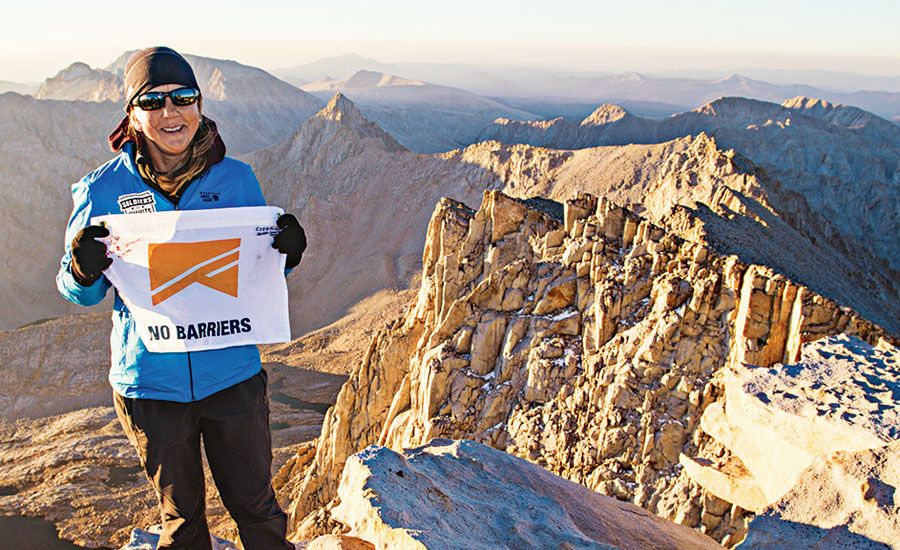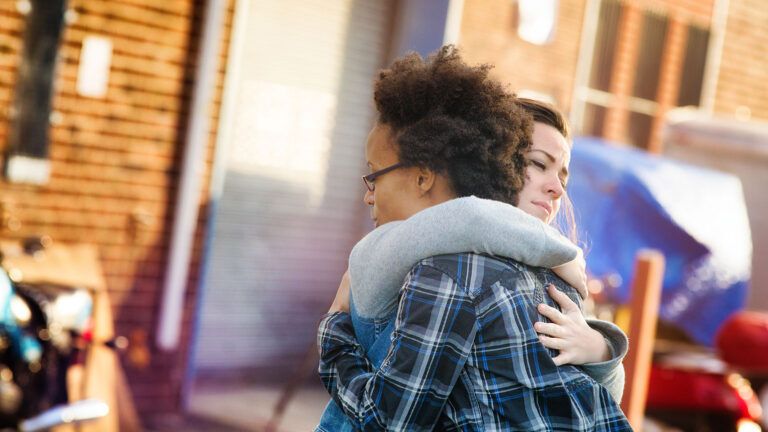I spent last spring doing something that might have stunned anyone who knows me—hiking deep in the backwoods on the Appalachian Trail. All by myself.
Why would people think that’s so strange? Well, for one thing, I lost my right eye in a roadside bomb attack while serving in the military in Baghdad. That same bomb blew away much of my shoulder and part of my cheek. I’m slowly losing vision in my left eye and I struggle to remember things that just happened—the result of a traumatic brain injury (TBI).
On top of everything else, I live with PTSD. It’s not as bad as when I first came home from Iraq. But loud noises still scare me. I rarely get a full night’s sleep. I scan my surroundings constantly. Doesn’t sound much like a confident outdoorswoman, does it? And yet, as I hiked through those lush eastern woodlands and topped out on peak after peak, there was no place on earth I’d rather have been.
Order Your Free Copy of Our Booklet, Financial Readiness!
I’m in my late forties now, and there is nothing in my past to indicate that I’d end up a dedicated long-distance solo hiker. I grew up in a military family in Rhode Island. We did not hike. Outdoors for me was the backyard.
Mom and Dad both served in the Navy, and my three older brothers went into the military too. So it was pretty obvious what I’d do after school. I joined the Air Force and became a law-enforcement specialist. I moved up to become a special investigator and eventually found myself doing counterintelligence in Baghdad at the height of the fighting.
One day in February 2006 I was told to assemble a team to meet with an informant in the city. I gathered a security detail and asked Dan, a civilian intelligence agent who worked as my partner, to accompany me. We piled into two SUVs and set out.
A bomb detonated on the right side of our convoy. I was conscious long enough to know I’d been hurt. Then I passed out. I awoke five days later at a military hospital in Germany. It was there that someone told me Dan had been killed, along with Jesse, one of the National Guardsmen on the security detail.
All I could think was, Why not me? I was a single woman with no children. Dan and Jesse were fathers. How could the God I had prayed to as a kid allow such a thing to happen? How? Lying there in my hospital bed, I felt guilt and anger build inside me until they seemed to fill my soul. Why bother praying? God obviously didn’t care—if he was even there at all.
I spent three months at Walter Reed Army Medical Center in Washington, D.C., enduring multiple surgeries until at last I had decent vision in my left eye, a prosthetic in my right eye and a mostly functional shoulder.
READ MORE: A MARRIAGE THAT OVERCAME PTSD AND TBI
The treatment focused on my physical symptoms. Like a good airman, I pushed on, trying to ignore the deeper injury inside me. But I couldn’t. I couldn’t stop thinking about Dan and Jesse. Anger and guilt consumed me. I became anxious and withdrawn. I barely slept.
One day, just to see what would happen, I walked into the chapel at Walter Reed. I lasted less than five minutes in the white wooden pews. The more I stared at the lectern up front with its Bible lying open, the madder I got.
I left Walter Reed and threw myself into work. I could no longer serve in a combat zone so I transferred back to law enforcement, doing internal investigations at an Air Force base in Colorado. That was a challenge, since my short-term memory was shaky and my shoulder injury made some of the physical aspects of the job more difficult.
I was becoming a recluse, afraid even to leave my house. Finally I couldn’t take it. I got referred to the medical center at Fort Carson and was diagnosed with TBI and PTSD. Soon afterward, I took medical retirement.
In 2013, I decided to return to Rhode Island, to the house I’d grown up in. By then both my parents had died and the house stood vacant. One morning, shortly before moving back home, I woke up with words echoing in my mind, as if someone had been speaking in my sleep. You owe it to Dan and Jesse to keep living.
I lay there, stunned. And yet, at the same time, I felt more clearheaded than I had in years. The words rang deeply true. The question was—what to do about them?
That very day, I was on my computer and saw an e-mail from an organization called No Barriers. “Just for veterans: Climb Mount Whitney!” the subject line said. I got e-mails like that all the time, promoting stuff for veterans.
READ MORE: TBI SPARKS MARINE’S MOST DIFFICULT BATTLE
Keep living. If I hadn’t heard those words earlier that morning, I would have deleted the e-mail without a thought. I clicked on it instead, even though climbing the tallest peak in the contiguous United States—14,505 feet—was about the last thing I ever imagined myself doing.
I’d heard of No Barriers. It was a nonprofit organization dedicated to helping disabled people gain confidence through wilderness adventures. It had a special mountain-climbing program for veterans sponsored by Wells Fargo. I replied to the e-mail, asking for more information.
I heard back almost right away: Would I be willing to talk by phone? Whoa. Cautiously I answered yes. Soon I was on the phone with a cheerful, energetic woman who gently but persistently got me to tell my story and explain why doing something like climbing Mount Whitney might help me.
I was surprised to hear myself say, “I think a challenge like that might be just what I need to get out of my depression.”
I found an outdoors group in Rhode Island and began hiking and jogging to get in shape for the climb. At first I had to force myself to go on the hikes. But they weren’t as bad as I’d feared. The other hikers were willing to talk or not talk, whatever I felt comfortable with. Something about being in the woods seemed to mellow people out—including me. Soon I was looking forward to the outings.
Late that spring, No Barriers flew me and a dozen or so other veterans to Colorado for a training hike in the Rockies. We hiked at high altitude and camped in snow. During a second outing, we worked on team-building, walking blindfolded on a rope team and helping each other cross bridges and creeks.
No one talked about their injuries, even though some of us were obviously wounded. It was as if the moment we arrived in the mountains, we became people again—just hikers, not troubled veterans. The motto of No Barriers is “What’s within you is stronger than what’s in your way.” Every step I took seemed to make those words more real.
READ MORE: 4 TIPS TO HELP CAREGIVERS OF TBI SURVIVORS
At last we flew to California and assembled at the trailhead for Mount Whitney. Before us, the escarpment of the Sierra Nevada rose precipitously. Whitney towered above it all. We hiked through sagebrush, then through sparse stands of pine and finally emerged above the tree line into a rocky, barren wilderness.
The more rugged the landscape grew, the more peaceful and confident I felt. As I lay at night under a canopy of stars, listening to the wind rustling my tent, it didn’t matter whether I slept or not. I felt a presence in the wilderness. Maybe the same presence that had spoken to me all those months ago, setting me off on this adventure.
The day of the summit climb dawned clear. We left our heavy packs at a staging area and began the long, steep hike. I was nervous at first, but then I looked around at all my teammates. If they could do it, so could I.
And I did do it. Suddenly the trail topped a rise and we were there, at the jumbled, rocky summit, along with a few other hardy souls. The wind blew strong and cold but I didn’t care. I stood there gazing up and down the Sierra Nevada range, out toward Death Valley and beyond.
READ MORE: LOVE RENEWED–A MARRIAGE STRENGTHENED BY STRIFE
Surrounded by all that beauty, that abundant evidence of God’s powerful work in the world, I knew I was going to be okay. I didn’t have to understand why Dan and Jesse died. What mattered was living. For Dan and Jesse. For myself. And for the One who made me and sustains me. The One who led me here.
For years I’d been convinced that God either didn’t exist or didn’t care. Now I knew it was me who’d stopped listening for his voice and looking for his love. Well, here they were. In all their rugged, unchangeable glory.
The minute I got home from Whitney, I knew I needed another challenge. I made plans to hike the Appalachian Trail, which traverses the eastern landscape I love.
I started at the trail’s southern terminus in Georgia. I relished the solitude, yet I welcomed the company of fellow hikers when I met them. I wore a GPS tracking device and posted on Facebook whenever I was in Wi-Fi range, so my siblings knew where I was. I had to pull off the trail a few times for various reasons. But I know I’ll finish. If not this year then someday.
I’m living now. That’s the toughest— and most rewarding—trail of all. One I never walk alone.
Did you enjoy this story? Subscribe to Guideposts magazine.




